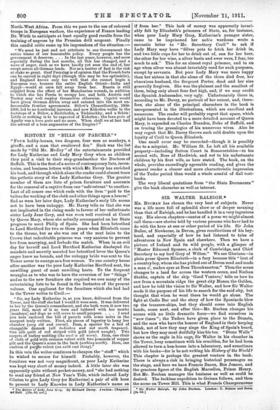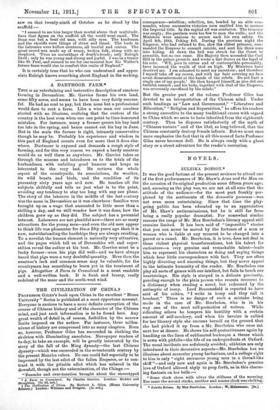SIR WALTER RALEIGH.*
Ma. BUCHAN has chosen the very best of subjects. Never was a life more full of splendid show or of deeper meaning than that of Raleigh, and he has handled it in a very ingenious way. His eleven chapters—cantos of a poem we might almost call them—are stories told by various persons who have had to do with the hero at one or other period of his life. Sir John Buller, of Newkerne, in Devon, gives recollections of his boy- hood, and especially of how he had listened to tales of adventures in New Spain and elsewhere. Then we have a picture of Ireland and its wild people, with a glimpse of " Master Edmund Spenser, a clerk of Cambridge, and Chief Secretary to my lord Grey of Wilton." We see Gloriana—in plain prose Queen Elizabeth—in a fury because this "lout of a country boy, whom she has picked out of Devon mud and made a man o', makes eyes at Bess Throckmorton." Then the scene changes to a land far across the western ocean, and Nathan Stubbs, captain of the ship ' Good Venture,' tells us how he saw from a mountain ridge the great city Manoa the Golden, and how he told the vision to Sir Walter, and how Sir Walter made it the purpose of his life to search for the said city, but thought that when he went there he would go alone. The fight at Cadiz Bar and the story of how the Spaniards blew up the treasure-ships, lest they should come into English hands, come next, and after this—Mr. Buchan changes his scenes with no little dramatic force—we find ourselves in "new times"; the Tudors have given place to the Stuarts, and the men who have the honour of England in their keeping think, not of how they may singe the King of Spain's beard, but how they may most dutifully kiss his toe. " Stone Walls " shows us the eagle in his cage, Sir Walter in his chamber in the Tower, busy sometimes with his crucibles, for he had been allowed to turn a hen-house into a laboratory, and sometimes with his books—for is he not writing his History of the World? This chapter is perhaps the greatest venture in the book. There is always a risk in bringing historical personages on the stage, and here we have Francis Bacon, Ben Jonson, and the gracious figure of the English Marcellus, Prince Henry. But Mr. Buchan manages the business as well as could be desired. The luckless expedition to Guiana follows, and then the scene on Tower Hill. This is what Francis Champernowne • Sir Walter Raleigh. By John Buchan. London: T. Nelson and Sons. [3.. 6d.3
saw on that twenty-ninth of October as he stood by the scaffold :—
" I seemed to see him larger than mortal above that multitude. Save that figure on the scaffold all the world went small. The Dean was but a bent old man, with silly eyes. The headsman and the sheriffs were things of straw and tinsel Tho lords in the balconies were hollow creatures, all tearful and craven. The great crowd was made up of weary, broken folk, sheep with no shepherd. 'Twas an assemblage of death's-heads ; only Raleigh lived ; only he was young and strong and joyful. I was in a trance like St. Paul, and seemed to see for one moment how Sir Walter's future fame would rise to comfort this realm of England."
It is certainly true that he who can understand and appre- ciate Raleigh knows something about England in the making.



















































 Previous page
Previous page